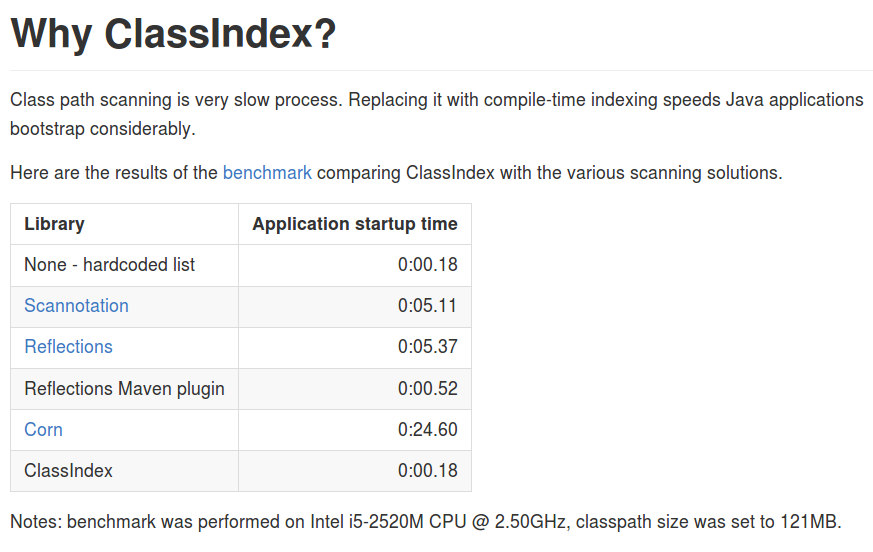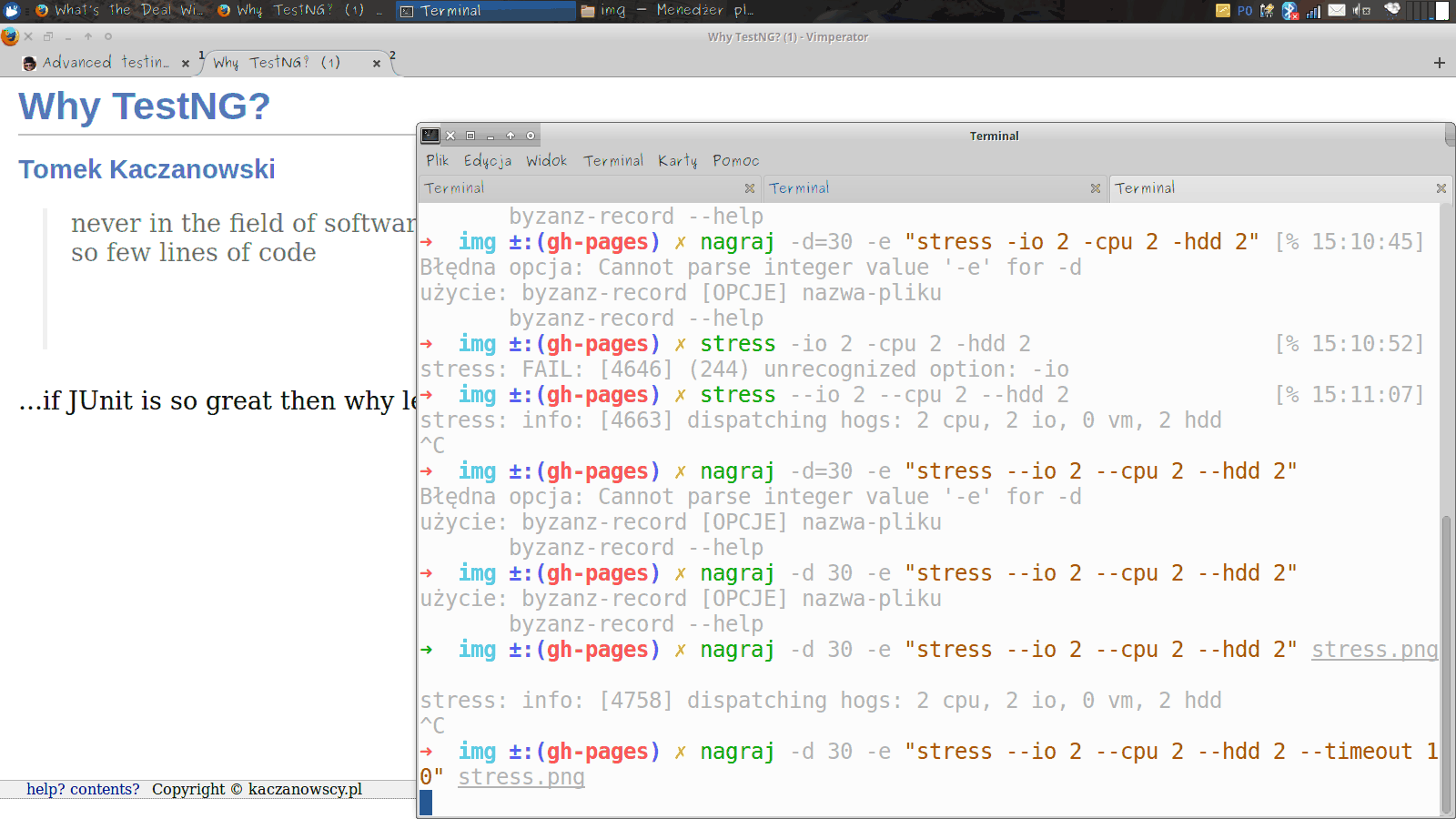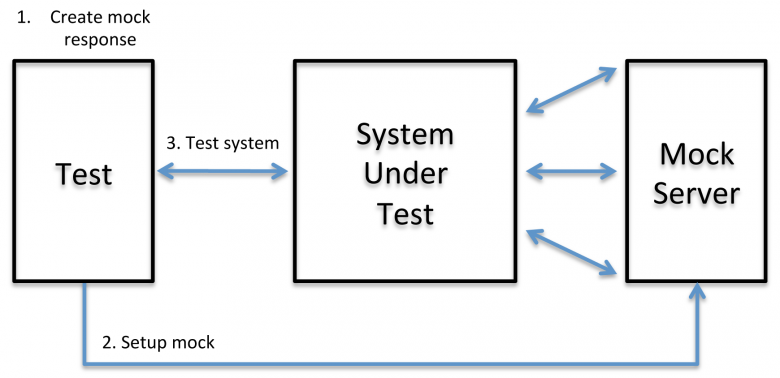
Advanced testing tools
Parametrised testing, system testing, NFR testing…
Tomasz Borek, @LAFK pl
About me

Today
We cover
Parametrised testing
|
NFR and system tests
|
new JUnit, yet unreleased and alpha
|
and many others
| Shallow - preso != workshop or training. |
Questions?

Or tweet me @LAFK_pl
Parametrised tests
TestNG
@DataProviderJUnit 4.12
JUnit Zohhak
JUnitParams
JUnit Theories
Property tests
TestNG
DataProvider
// Provides data to any test method declaring Data Provider named "nameAndAge"
@DataProvider(name = "nameAndAge")
public Object[][] nameIrrelevant() {
return new Object[][]{
{"Cedric", 36},
{"Anne", 37},
{"Tommy", 8},
{"Seoman", 18}, // who remembers Seoman Snowlock?
{"Miriamele", 19} // hint perhaps?
};
}TestNG Tests
Test that uses it
@Test(dataProvider = "nameAndAge")
public void verifyData1(String name, Integer age) {
System.out.println(name + " " + age);
}
@Test(dataProvider = "nameAndAge")
public void verifyData1Again(String name, Integer age) {
Assert.assertNotNull(name, "Name null for " + name + age);
Assert.assertNotNull(age, "Age null for " + name + age);
}Soft Assertions in TestNG
@Test(dataProvider = "nameAndAge")
public void verifyData1LastTime(String name, Integer age) {
SoftAssert soft = new SoftAssert();
soft.assertTrue(age > 18, name + " not of age in Europe!");
soft.assertTrue(age > 21, name + " not of age in US!");
soft.assertAll();
}
}JUnit 4.11
@Parameterized and @Rule and constructor@RunWith(Parameterized.class)
public class AppParameterizedTest {
@Rule
public final JUnitSoftAssertions softly = new JUnitSoftAssertions();
private String name;
private Integer age;
public AppParameterizedTest(String n, Integer a) {
this.name = n;
this.age = a;
}JUnit 4.11, cont.
@Parameterized @Parameterized.Parameters(name = "{index}: name: {0} age: {1}")
public static Collection<Object[]> data() {
return Arrays.asList(new Object[][]{
{"Cedric", 36},
{"Anne", 37},
{"Tommy", 8},
{"Seoman", 18}, // who remembers Seoman Snowlock?
{"Miriamele", 19} // hint perhaps?
});
}JUnit 4.11 test that uses it
@org.junit.Test
public void verifyData1() {
System.out.println(name + " " + age);
}
@org.junit.Test
public void verifyData1Again() {
// reversed message - condition order
org.junit.Assert.assertNotNull("Name null for " + name + age, name);
org.junit.Assert.assertNotNull("Age null for " + name + age, age);
}JUnit 4.11 soft assertions
Remember
@Rule JUnitSoftAssertions …? /**
* @see <A HREF="http://joel-costigliola.github.io/assertj/assertj-core-features-highlight.html#soft-assertions">AssertJ SoftAssertions 4 JUnit</A>
*/
@org.junit.Test
public void verifyData1LastTime() {
softly.assertThat(age).as(name + " not of age in Europe! (JU+AJ)").isGreaterThan(18);
softly.assertThat(age).isGreaterThan(21).as(name + " not of age in US! (JU+AJ)");
}
}JUnit - brief history
4.7 brought
@Rule ErrorCollector4.11 brought description for
@Parameterized4.12 brought other types for
@Parameterized(Object[]andIterable)5.0 deals away with rules and runners…
Zohhak
Simplifies parametrised testing for JUnit

Zohhak test
import com.googlecode.zohhak.api.TestWith;
import com.googlecode.zohhak.api.runners.ZohhakRunner;
import org.junit.runner.RunWith;
@RunWith(ZohhakRunner.class)
public class AppZohhakTest {
@TestWith({
"36, Cedric",
"37, Anne",
"8, Tommy",
"18, Seoman",
"19, Miriamele" })
public void personIsAdult(int age, String name) {
org.assertj.core.api.Assertions.assertThat(age).isGreaterThanOrEqualTo(18).as("adult in EU");
org.assertj.core.api.Assertions.assertThat(age).isGreaterThanOrEqualTo(21).as("adult in US");
}
}JUnitParams
@RunWith(JUnitParamsRunner.class)
public class AppJUnitParamsTest {
@Test
@junitparams.Parameters({
"36, Cedric",
"37, Anne",
"8, Tommy",
"18, Seoman",
"19, Miriamele" })
public void personIsAdult(int age, String name) {
org.assertj.core.api.Assertions.assertThat(age).isGreaterThanOrEqualTo(18).as("adult in EU");
org.assertj.core.api.Assertions.assertThat(age).isGreaterThanOrEqualTo(21).as("adult in US");
}
}JUnit Theories
Aka Poppler project.
@RunWith(Theories.class)
public class AppTheory {
@DataPoints
public static Person[] personProvider() {
return new Person[] {
new Person("Cedric", 36),
new Person("Anne", 37),
new Person("Tommy", 8),
new Person("Seoman", 18), // who remembers Seoman Snowlock?
new Person("Miriamele", 19), // hint perhaps?
new Person(null, 22)
};
}Theories, not tests
/**
* In THEORY, name is 'of age' after 'name' reaches 18. Assuming 'name' shan't be null,
*
* THEORY however is wrong if one case disproving it is found, so... SoftAssertions again!
*/
@Theory(nullsAccepted = true)
public void ofAge(Person p) {
Assume.assumeNotNull(p.name);
Assume.assumeNotNull(p.age);
org.assertj.core.api.Assertions.assertThat(p.age).as(p.name + "? Not in Europe").isGreaterThan(18);
org.assertj.core.api.Assertions.assertThat(p.age).isGreaterThan(21).as(p.name + "? Not in US");
}
}Soft Assertions?
TestNG has them built-in, simply, as LinkedHashMap.
JUnit has
ErrorCollectorruleJUnitSoftAssertionsrulebut rules may cause troubles (ordering)
.
Summary?
TestNG:
@DataProvider, XML, good error reporting and grouping.JUnit: constructor, static methods, strange reporting (until 4.7)
Remedied with Zohhak or JUnitParams (params via annotation)
JUnit Theory: strict, mathematical - seen property testing?
Why TestNG?
click to follow to original
JUnit 5
From JUnit Lambda crowdfunding
Can run JUnit 4 tests or new ones (2 engines)
Straighten up concepts, shaked out
@Ruleor@RunWithNo IDE support now, only Console runner, Maven or Gradle
http://junit.org/junit5/ (user guide, Javadocs, forums)
http://www.codeaffine.com/2016/02/18/junit-5-first-look/
JUnit 5 from Maven
$ ➜ git clone https://github.com/junit-team/junit5-samples.git
$ ➜ cd junit5-maven-consumer
$ ➜ mvn test
-------------------------------------------------------
T E S T S
-------------------------------------------------------
Running com.example.project.SecondTest
Tests run: 1, Failures: 0, Errors: 0, Skipped: 1, Time elapsed: 0.055 sec - in com.example.project.SecondTest
Running com.example.project.FirstTest
Tests run: 1, Failures: 0, Errors: 0, Skipped: 0, Time elapsed: 0.01 sec - in com.example.project.FirstTest
Running com.example.project.JUnit4Test
Tests run: 1, Failures: 0, Errors: 0, Skipped: 0, Time elapsed: 0.021 sec - in com.example.project.JUnit4Test
Results :
Tests run: 3, Failures: 0, Errors: 0, Skipped: 1
$ ➜ junit5-maven-consumer git:(master) tree src
src
└── test
└── java
└── com
└── example
└── project
├── FirstTest.java
├── JUnit4Test.java
└── SecondTest.java
$ ➜ junit5-maven-consumer git:(master) vim pom.xmlFirstTest.java
import static org.junit.gen5.api.Assertions.assertEquals;
import org.junit.gen5.api.DisplayName;
import org.junit.gen5.api.Test;
import org.junit.gen5.api.TestInfo;
class FirstTest {
@Test
@DisplayName("My 1st JUnit 5 test! 😎")
void myFirstTest(TestInfo testInfo) {
assertEquals(2, 1 + 1, "1 + 1 should equal 2");
assertEquals("My 1st JUnit 5 test! 😎", testInfo.getDisplayName(), () -> "TestInfo is injected correctly");
}
}SecondTest.java
import static org.junit.gen5.api.Assertions.assertEquals;
import org.junit.gen5.api.Disabled;
import org.junit.gen5.api.Test;
class SecondTest {
@Test
@Disabled
void mySecondTest() {
assertEquals(2, 1, "2 is not equal to 1");
}
}JUnit4Test.java
import static org.junit.Assert.assertEquals;
import org.junit.Test;
public class JUnit4Test {
@Test
public void test() {
assertEquals(3, 1 + 2);
}
}Third - our - test
import static org.junit.gen5.api.Assertions.assertEquals;
import static org.junit.gen5.api.Assertions.assertAll;
import org.junit.gen5.api.DisplayName;
import org.junit.gen5.api.Test;
import org.junit.gen5.api.TestInfo;
class ThirdTest {
@Test
@DisplayName("Experimental parametrized test!")
void myFirstParameterizedTest(TestInfo testInfo) {
assertAll("display name",
() -> assertEquals(2, 1 + 1, "1 + 1 should equal 2"),
() -> assertEquals("Experimental parametrized test", testInfo.getDisplayName(), () -> "TestInfo is injected correctly")
);
}
}Running it?
via mvn test:
Running com.example.project.ThirdTest
Tests run: 1, Failures: 1, Errors: 0, Skipped: 0, Time elapsed: 0.001 sec <<< FAILURE! - in com.example.project.ThirdTest
Experimental parametrized test! Time elapsed: 0.001 sec <<< FAILURE!
org.opentest4j.MultipleFailuresError:
display name (1 failure)
TestInfo is injected correctly ==> expected: <Experimental parametrized test> but was: <Experimental parametrized test!>
at com.example.project.ThirdTest.myFirstParameterizedTest(ThirdTest.java:16)
Running com.example.project.JUnit4Test
Tests run: 1, Failures: 0, Errors: 0, Skipped: 0, Time elapsed: 0.026 sec - in com.example.project.JUnit4Test
Results :
Failed tests:
ThirdTest.myFirstParameterizedTest:16 display name (1 failure)
TestInfo is injected correctly ==> expected: <Experimental parametrized test> but was: <Experimental parametrized test!>
Tests run: 4, Failures: 1, Errors: 0, Skipped: 1First NF requirements
- EXTENSIBILITY
ability to extend and modify software quickly and easily
- CONFIGURABILITY
ability to tune software to your needs, switch configs on the fly, dynamically update it without restart…
- MODULARITY
organising software into modules, for reuse, understanding and cohesion
How can we make sure these are met?
NFR tests here are…
System tests.
Examples
|
Tools?
Classpath scanning
|
ClassIndex

Usability
- USABILITY
how well we can use the software, how much "usable" is it. UX, UI, intuitiveness and composition of the interface…
And here?
Usability tests are end to end tests
Scenarios (how hard it would be to add "undo" feature to a given screen?
End-to-end tests
Tools
Gauge, by ThoughtWorks
https://github.com/getgauge/gauge-example-java
http://getgauge.io/get-started/index.html
Techniques?
PRETOTYPING
Performant software?
- HIGH AVAILABILITY
software - despite whatever - remains able to work
- RELIABILITY
software performs the service without problems
Tests for performant software?
- LOAD tests
can we shoulder load we are anticipating, up till our ceiling?
- SOAK tests
how much abuse can we take once we PASS the ceiling?
- ENDURANCE tests
for how long can we run within our anticipated range?
Tools?
stress
Gatling
Stress
$ sudo apt-get install stress
$ man stress
$ htop
$ stress --cpu 4 --io 3 --hdd 3 --vm 2 --vm-bytes 128MStressing the machine

Gatling
Extra
Alias "everything else" :-)
DataBene Benerator

Infinitest
WireMock by Tom Akenhurst
http://wiremock.org/java-usage.html - web-service test double

Awaitability
Asynchronous tests?

Tools

